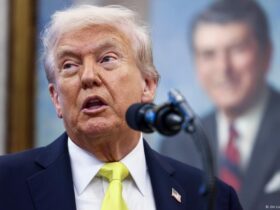Hardly a night goes by when there is no Russian air attack on Ukraine. Last Sunday night alone, approximately 500 drones and rockets were fired at targets in Ukraine. As it turned out, many of those missiles contained Western-made components.
Earlier in the week, Ukrainian President Volodymyr Zelensky hinted at this in a filmed message, saying that somehow high-tech components – circuit boards, microchips, sensors, converters, semiconductors and control units – had reached Russia, despite Western sanctions on the country.
He said more than 100,000 internationally obtained components were found in the debris of weapons and drones following Sunday’s attack. Many came from Germany and other European countries, as well as originally from the US and Taiwan.
Zelensky had some harsh words for his Western allies. Almost all components are actually on the international sanctions list and are not allowed to be exported to Russia.
“If some countries stop clearly reprehensible plans to supply Russia with critical components for the production of missiles and drones, the Russian threat will be significantly reduced,” the Ukrainian president argued in a message posted on the social media site, X.
A complicated route to Russia
“It should be noted that export controls on many of these items were imposed just in time for a major Russian offensive in the spring of 2022,” said Benjamin Hilgenstock, a senior economist at the Kyiv School of Economics, or KSE, who focuses on international sanctions on Russia. “These controls have been tightened somewhat [and] “It expanded to include other product groups, but essentially they existed for the entire duration of this war.”
Over the past three and a half years, the EU has imposed 18 different packages of sanctions on Russia over a full-scale invasion of Ukraine in 2022. In July, the EU also tightened export restrictions on so-called “dual-use” goods – that is, products that can be used for both civilian and military purposes.
Nevertheless, according to Hilgenstock, many such goods are still reaching Russia in some way or another. Often this involves a lot of intermediaries, for example, in China, the UAE, Türkiye or Kazakhstan.
“This means that in many cases, a Western company legally sells its component to a business partner in another country. That partner, in turn, resells the component, and so on, and so on, until ultimately he ends up with someone who resells it and ships it to Russia,” the expert explained.
The problem is well known. This is why the EU has started imposing sanctions on middlemen in third countries who are selling products to Russia.
“But of course, it’s a bit of a cat-and-mouse game,” Hilgenstock added, “because it’s relatively easy to build a new intermediate just three doors down the same corridor.”
No way to inspect exports
In a study published in January last year, Hilgenstock and KSE colleagues analyzed the international sanctions regime against Russia.
Making things even more difficult is that many components are not even made in Western countries. “They may be manufactured by Western companies but not necessarily here [in the West]For example, perhaps offshore in factories in Southeast Asia,” Hilgenstock explained. “This means that some of these components never physically pass through EU territory.” This, he said, is a factor that makes it almost impossible for EU customs or other authorities to inspect exports.
However, that doesn’t mean restrictions don’t have any benefits, Hilgenstock said.
He argued, “We cannot be expected to stop the export of every single computer chip to Russia.” “We also know that Russia pays dramatically higher prices for these parts than any other country in the world. And that in itself is a success because it means Russia gets significantly less for the same money, possibly even of worse quality, and everything takes longer, and is delayed again and again.”
Of course, there are improvements that can be made, he continued. He suggested that manufacturers of sanctioned goods should be better held accountable for controlling and securing their distribution networks, and for ensuring that sanctioned goods do not end up in Russia.
EU politics will be required
The financial sector offered positive examples, Hilgenstock pointed out: “For decades, there have been very specific requirements in the financial sector with respect to money laundering and terrorism financing.”
He explained that banks have invested significant resources in internal processes and checks that allow them to comply with those rules and requirements, so that they know what kind of transactions they are doing and with whom.
“We have to get to the same point with this [sector]But it’s a process, and it takes time,” Hilgenstock acknowledged.
Moreover, for this to happen, there needs to be real political will to move forward. And there is no real consensus on this at the European level, he said.
He pointed out that it is not just the usual suspects – countries that often support Russia, such as Hungary or Slovakia – that have blocked such a process.
“Other countries, including Germany, have also not agreed on more comprehensive due diligence for companies.”
His conclusion on sanctions on Russia: “There are still shortcomings, and these shortcomings can be addressed.”
This article was originally published in German.






Leave a Reply